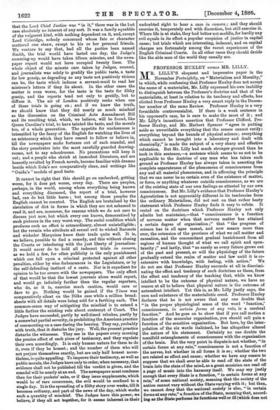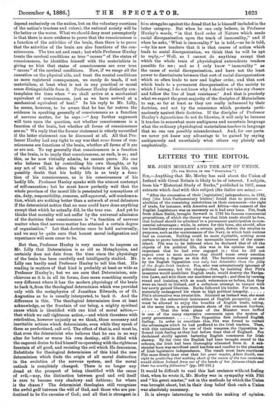PROFESSOR HUXLEY versus MR. LILLY.
MR. LILLY'S eloquent and impressive paper in the November Fortnightly, on "Materialism and Morality," in which, while confessing that Professor Huxley does not accept the name of a materialist, Mr. Lilly expressed his own inability to distinguish between the Professor's doctrine and that of the materialists, at least in relation to its tendency and effects, has elicited from Professor Huxley a very smart reply in the Decem- ber number of the same Review. Professor Huxley is a very formidable controversialist. If there is a weak sentence in his opponent's case, he is sure to make the most of it ; and Mr. Lilly's incautious assertion that Professor Clifford, Vro- fessor Huxley, and Mr. Herbert Spencer "agree in putting aside as unverifiable everything that the senses cannot verify; everything beyond the bounds of physical science ; everything which cannot be brought into a laboratory and dealt with chemically," is made the subject of a very sharp and effective refutation. But Mr. Lilly had much stronger ground than he took in this sentence,—a sentence which seems to us not to be applicable to the doctrine of any man who has taken such ground as Professor Huxley has always taken in asserting the complete separateness of the phenomena of consciousness from any and all material phenomena, and in affirming the principle that we can never be as certain even of the existence of matter, or force, or anything whatever outside consciousness, as we are of the existing state of our own feelings as attested by our own consciousness. But Mr. Lilly's evidence that Professor Huxley's Agnosticism is not appreciably different in its tendencies from the ordinary Materialism, did not rest on that rather hasty statement which Professor Huxley finds it easy to refute. It rested on the doctrines which Professor Huxley not only admits but maintains,—that "consciousness is a function of nervous matter when that nervous matter has attained a certain degree of organisation ;" that "the progress of science has in all ages meant, and now means more than ever, the extension of the province of what we call matter and causation, and the concomitant gradual banishment from all regions of human thought of what we call spirit and spon- taneity ;" and lastly, that "as surely as every future grows out of the past and present, so will the physiology of the future gradually extend the realm of matter and law until it is co- extensive with knowledge, with feeling, with action." We do not see that Professor Huxley succeeds at all in discrimi- nating the effect and tendency of such doctrines as these, from the effect and tendency of the teaching that, while we know intellect to be the outcome of physical nature, we have no reason at all to believe that physical nature is the outcome of antecedent intellect. Yet this is, as Mr. Lilly justly says, the sum and substance of the materialistic creed. Professor Huxley declares that he is not aware that any one doubts that "in the proper physiological sense of the word function,' consciousness, in certain forms at any rate, is a cerebral function." And he goes on to show that if you call motion a function of the muscular organisation, you should call pain a function of the sensitive organisation. But here, by the inter- polation of the six words italicised, he has altogether altered the nature of his statement. Certainly no one doubts the manifold entanglements of consciousness with the organisation of the brain. But the very point in dispute is not whether, "in certain forms at any rate," consciousness is not a function of the nerves, but whether in all forms it is so ; whether the two are related as effect and cause; whether we have any reason to suppose that we shall ever be able to read off the state of the brain into the state of the mind, as a great musician can read off a page of music into the harmony itself. We may say justly enough that every State is a function, "in certain forms at any rate," of some national society, meaning that the society of the nation cannot vary without the State varying with it; but then, we cannot deny that the national society is also, "in certain forms at any rate," a function of the State, meaning that, accord- ing as the State performs its functions well or ill (which does not depend exclusively on the nation, but on the voluntary exertions of the nation's trustees and rulers), the national society will be the better or the worse. What we should deny most peremptorily is that there is more evidence to prove that the consciousness is a function of the activities of the brain, than there is to prove that the activities of the brain are also functions of the con- sciousness. The two act and react; but while Professor Huxley treats the cerebral conditions as true " canoes " of the states of consciousness, he identifies himself with the materialis to in giving no hint that states of consciousness are ever true " causes " of the cerebral conditions. Now, if we range all the causation on the physical side, and treat the mental conditions as mere registered consequences, we surely do teach, if not materialism, at least what is not in any practical or moral sense distinguishable from it. Professor Huxley distinctly con- templates the time when "we shall arrive at a mechanical equivalent of consciousness, just as we have arrived at a mechanical equivalent of heat." In his reply to Mr. Lilly, he seems, however, to be aware that he has far outrun the evidence in speaking generally of consciousness as a function of nervous matter, for he says :—" Any further argument will turn upon the question, not whether consciousness is a function of the brain, but whether all forms of consciousness are so." We reply that the former statement is utterly unverified if the latter statement can be discussed at all. All that Pro- fessor Huxley had any right to say was that some forma of con- sciousness are functions of the brain, whether all forms of it are or are not. To say generally that consciousness is a function of the brain, is to imply that consciousness, as such, is so ; and this, as he now virtually admits, he cannot prove. No one who believes that by controlling his own thoughts, or by any act of will, he alters the whole future of his life, can possibly doubt that his bodily life is as truly a func- tion of his consciousness, as is his consciousness of his bodily life. Professor Huxley speaks with the utmost contempt of self-causation ; but he must know perfectly well that the
whole province of the moral life is penetrated by conceptions of sin, duty, responsibility, remorse, self-approval, self-condemna-
tion, which are nothing better than a network of cruel delusions if the determinist notion that no man could have done anything except that which he actually did, be the true one. And yet he thinks that morality will not stiffer by the universal admission of the doctrine that consciousness is "a function of nervous matter when that nervous matter has attained a certain degree of organisation." Let that doctrine once be held universally, and we may be quite sere that honest moral indignation and repentance will soon cease to be.
But then, Professor Harley is very anxious to impress on Mr. Lilly that Determinism is as old as Metaphysics, and certainly does not date from the time since the physiology of the brain has been carefully and intelligently studied. Mr. Lilly can hardly need Professor Huxley to tell him that. His reading in matters of that kind is probably at least as wide as Professor Huxley's ; but we are sure that Determinism, mis- chievous as it is in all its forme, does mean something morally very different where it has the modern physiology of the brain to back it, from the theological determinism which was provided only with the metaphysics of Jonathan Edwards, or of St. Augustine as he is usually interpreted, to back it. And the difference is this. The theological determinism does at least acknowledge, as the fountain of our being, a mighty spiritual cause which is identified with one kind of moral action,— that which we call righteous action,—and which threatens with retribution, however unjustly as we think, those necessary and inevitable actions which determinists, even while they speak of them as predestined, call evil. The effect of that is, and must be, that even the determinist who believes that he can in no way alter for better or worse his own destiny, still is filled with the eagerest desire to find himself co-operating with the righteous fountain of all good, and resisting the evil which He denounces. Substitute for theological determinism of this kind the new determinism which finds the origin of all moral distinction in the evolution of the nervous system, and the moral outlook is completely changed. There is no longer any dread at the prospect of being identified with the cause of evil,—nay, the distinction between good and evil itself is sure to become very shadowy and dubious ; for where is the chasm P The determinist theologian still recognises the awful gulf between the will of God, and those who are pre- destined to be the enemies of God; and all that is strongest in him struggles against the dread that he is himself included in the latter category. But when he can only believe, in Professor Huxley's words, "in that fixed order of Nature which sends social disorganisation upon the track of immorality," and if when he asks, 'What is immorality ?' he is told,—as he is told, —by his new teachers that it is that course of action which leads to social disorganisation, we think that he will be apt to reply,—' Well, as I cannot do anything except that which the whole train of physiological antecedents renders possible for me ; and as I only know " immorality " as the cause of social disorganisation, and have not the least power to discriminate between that sort of social disorganisation which so often leads to new and higher order, and that sort which leads to a permanent disorganisation of the society to which I belong, I do not know why I should not take my chance and follow the line of least resistance.' And that is precisely what we expect the great majority of the disciples of Materialism to say, so far at least as they are really influenced by their doctrine, and not by the conscience which protests perti- naciously against their doctrine. If the disciples of Professor Hurley's Agnosticism do not do likewise, it will only be because it teaches in. somewhat more ambiguous and uncertain language what the ordinary physiological materialism teaches in language that no one can possibly misunderstand. And, for our parts , we never yet knew any advantage to be gained by saying ambiguously and uncertainly what others say plainly and emphatically.







































 Previous page
Previous page